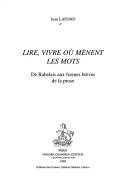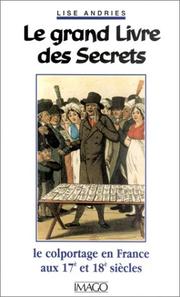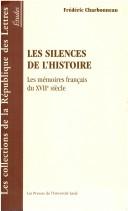| Listing 1 - 8 of 8 |
Sort by
|
Book
ISBN: 2851940228 9782851940223 Year: 1986 Publisher: Montpellier Fata Morgana
Abstract | Keywords | Export | Availability | Bookmark
 Loading...
Loading...Choose an application
- Reference Manager
- EndNote
- RefWorks (Direct export to RefWorks)
French essays --- French prose literature --- Aphorisms and apothegms --- Maxims, French --- History and criticism --- French essays - History and criticism --- French prose literature - 17th century - History and criticism --- Aphorisms and apothegms - History and criticism --- Maxims, French - History and criticism

ISBN: 2745300288 9782745300287 Year: 1999 Volume: 22 Publisher: Paris Champion
Abstract | Keywords | Export | Availability | Bookmark
 Loading...
Loading...Choose an application
- Reference Manager
- EndNote
- RefWorks (Direct export to RefWorks)
Fiction --- French literature --- anno 1600-1699 --- Genres [Letterkundige ] --- Genres [Literaire ] --- Genres littéraires --- Letterkundige genres --- Literaire genres --- Literary form --- French prose literature --- History and criticism --- Drama [Medieval ] --- Congresses --- Drama --- 15th-16th centuries --- European drama --- 1450-1600 (Renaissance) --- Theater --- History --- Medieval, 500-1500 --- 16th century --- Littérature française --- Littérature --- Middle Ages, 500-1500 --- French prose literature - 16th century - History and criticism --- French prose literature - 17th century - History and criticism --- FRANCE --- LITTERATURE FRANCAISE --- VIE INTELLECTUELLE --- HISTOIRE --- HISTOIRE ET CRITIQUE
Book
ISBN: 0691067937 1322018405 9781400860821 1400860822 9780691067933 0691605025 9780691605029 Year: 1990 Publisher: Princeton (N.J.): Princeton university press
Abstract | Keywords | Export | Availability | Bookmark
 Loading...
Loading...Choose an application
- Reference Manager
- EndNote
- RefWorks (Direct export to RefWorks)
Challenging the view of epistolary narrative as a faulty precursor to the nineteenth-century realist novel, Elizabeth MacArthur argues that the openness and flexibility that characterize correspondences, both real and fictional, reflect the preoccupations of the late seventeenth and eighteenth centuries. Her readings of the Lettres portugaises, Mme du Deffand's correspondence with Horace Walpole, and Rousseau's La Nouvelle Hlose propose an alternative to closure-oriented theories of narrative as they uncover an interplay between two forces: a tendency towards closure and meaning (metaphor) and a tendency towards openness and desire (metonymy). While such an interplay structures all narrative, the epistolary form differs from the third or first person in the extent to which metonymy predominates. The author shows how critics and editors of correspondences have attempted to control their metonymy, channeling epistolary energy into univocal meaning. By juxtaposing real and fictional epistolary works, MacArthur reveals the similarities between the two, particularly their "extravagance": ambiguity, openness, and forward-moving energy.Originally published in 1990.The Princeton Legacy Library uses the latest print-on-demand technology to again make available previously out-of-print books from the distinguished backlist of Princeton University Press. These editions preserve the original texts of these important books while presenting them in durable paperback and hardcover editions. The goal of the Princeton Legacy Library is to vastly increase access to the rich scholarly heritage found in the thousands of books published by Princeton University Press since its founding in 1905.
Epistolary fiction, French --- French prose literature --- Narration (Rhetoric) --- Closure (Rhetoric) --- Romance Literatures --- Languages & Literatures --- French Literature --- French literature --- French epistolary fiction --- French fiction --- Endings (Rhetoric) --- Last lines (Rhetoric) --- Peroration --- Rhetoric --- Narrative (Rhetoric) --- Narrative writing --- Discourse analysis, Narrative --- Narratees (Rhetoric) --- History and criticism --- 840-6 --- 840-6 Franse literatuur: brief --- Franse literatuur: brief --- Closure (Rhetoric). --- Epistolary fiction, French -- History and criticism. --- French prose literature -- 17th century -- History and criticism. --- French prose literature -- 18th century -- History and criticism. --- Narration (Rhetoric). --- History and criticism.

ISBN: 2902702876 9782902702879 Year: 1994 Publisher: Paris Imago
Abstract | Keywords | Export | Availability | Bookmark
 Loading...
Loading...Choose an application
- Reference Manager
- EndNote
- RefWorks (Direct export to RefWorks)
Sociology of literature --- anno 1600-1699 --- anno 1700-1799 --- France --- Booksellers and bookselling --- Chapbooks, French --- Popular literature --- Libraires et librairie --- Colporteurs et colportages --- Livres de colportage --- Paralittérature --- Colportage, subscription trade, etc --- Publishing --- History --- History and criticism --- Colportage, souscription, etc. --- Histoire --- Histoire et critique --- Intellectual life --- Vie intellectuelle --- French prose literature --- -French prose literature --- -Chapbooks, French --- -Chap-books, French --- French chapbooks --- French literature --- -History and criticism --- Paralittérature --- Chap-books, French --- Colportage, subscription trade, etc. --- French prose literature - 17th century - History and criticism --- French prose literature - 18th century - History and criticism --- Chapbooks, French - History --- LITTERATURE POPULAIRE FRANCAISE --- LITTERATURE POPULAIRE --- FRANCE --- CULTURE POPULAIRE --- LITTERATURE DE COLPORTAGE --- HISTOIRE ET CRITIQUE --- 17E-18E SIECLES
Book
ISBN: 9782600017466 2600017461 Year: 2014 Volume: 524 Publisher: Genève : Librairie Droz,
Abstract | Keywords | Export | Availability | Bookmark
 Loading...
Loading...Choose an application
- Reference Manager
- EndNote
- RefWorks (Direct export to RefWorks)
Sans prétendre à l’exhaustivité, cette étude se propose de retracer l’histoire littéraire du livre de piété en prose dans le milieu réformé européen francophone, des origines de la Réforme jusqu’à la révocation de l’Edit de Nantes, en accordant une place de choix à la méditation, qui domine la production de ces ouvrages. Il s’agit de replacer les expressions de la dévotion dans leur contexte socio-historique, en lien avec l’histoire singulière d’une communauté de croyants. La littérature de piété n’est pas strictement spirituelle, elle est aussi existentielle et résolument militante. Opter pour la Réforme dès son origine, c’est entrer de plain-pied sur la scène de l’Histoire : prendre position dans la cité, s’exposer à payer le prix de ses croyances et de sa manière particulière d’aimer Dieu. Ce n’est pas seulement à l’aune de critères esthétiques que sera interrogé le concept d’identité confessionnelle appliqué à la littérature, mais aussi sous l’angle de l’histoire politique, religieuse, sociale et littéraire. Après un premier regard portant sur les origines du livre réformé tel qu’il s’affirme à partir des années 1550, l’ouvrage s’attache à dégager une typologie des pratiques de dévotion : la préparation à la mort, la méditation pénitentielle, la méditation sur les Psaumes, la préparation à la cène et les recueils méthodiques. Les derniers chapitres proposent, quant à eux, des synthèses sur les problématiques soulevées par le livre de piété : le militantisme dévotionnel, le langage de la piété, l’auctorialité, enfin le lectorat. Au fil de ce parcours, il s’agit de montrer le rôle primordial que joue le livre de piété dans la vulgarisation des pratiques et des savoirs religieux comme dans la constitution d’une langue littéraire repensée à partir de nouveaux critères rhétoriques.
French literature --- Fiction --- Christian church history --- anno 1600-1699 --- anno 1500-1599 --- Devotional literature, French --- Protestantism and literature --- French prose literature --- History and criticism --- History --- Littérature de dévotion française --- Protestantisme et littérature --- History and criticism. --- History. --- Histoire et critique. --- Histoire --- France --- Reformed Church --- Devotional litterature --- 16th-17th century --- 16th-17th century. --- Devotional literature, French - 16th century - History and criticism --- Devotional literature, French - 17th century - History and criticism --- Protestantism and literature - History --- French prose literature - 16th century - History and criticism --- French prose literature - 17th century - History and criticism --- Littérature de dévotion française --- Protestantisme et littérature
Book
ISBN: 2910381412 2379241228 9782910381417 Year: 1996 Publisher: Saint-Denis: Presses universitaires de Vincennes,
Abstract | Keywords | Export | Availability | Bookmark
 Loading...
Loading...Choose an application
- Reference Manager
- EndNote
- RefWorks (Direct export to RefWorks)
French prose literature --- Aphorisms and apothegms --- Maxims, French --- History and criticism. --- Pascal, Blaise, --- La Rochefoucauld, François, --- La Bruyère, Jean de, --- Criticism and interpretation. --- Criticism and interpretation --- French prose literature - 17th century - History and criticism. --- Aphorisms and apothegms - History and criticism. --- Maxims, French - History and criticism. --- Pascal, Blaise, - 1623-1662 - Criticism and interpretation. --- La Rochefoucauld, François, - duc de, - 1613-1680 - Criticism and interpretation --- La Bruyère, Jean de, - 1645-1696 - Criticism and interpretation. --- Pascal, Blaise, - 1623-1662 --- La Rochefoucauld, François, - duc de, - 1613-1680 --- La Bruyère, Jean de, - 1645-1696
Book
ISBN: 9401206406 1435695283 9781435695283 9042024763 9789042024762 9789401206402 9042024763 9789042024762 Year: 2008 Publisher: Amsterdam New York Rodopi
Abstract | Keywords | Export | Availability | Bookmark
 Loading...
Loading...Choose an application
- Reference Manager
- EndNote
- RefWorks (Direct export to RefWorks)
Travel narratives were the principal source of knowledge about the lands of the Near East and the Indian Ocean Basin in 17th-century France. Claiming the authority of first-hand observation, they paradoxically rely for their legitimization on the tropes of an established literary tradition. The status of these texts remained ambiguous, not least because of their anecdotal depictions of great riches, brutality or sexual promise. Drawing on the insights of post-colonial scholarship, this study tackles a question given scant attention in previous work and suggests that beyond the hazy representation of the Orient, an opposition emerges between the threatening Near East and the indolent East Indies. Distinguishing recognizable representations from those generated by new encounters, this book questions the feasibility of cultural representation through travel, exploring a large corpus of original sources written by French ecclesiastics, gentlemen-travellers, ambassadors and adventurers. Linguistic, religious, cultural or geographical barriers meant most travellers remained distanced from the peoples about whom they would simultaneously become authoritative. The encounter was further transformed in narratives that were intended to entertain and to satisfy the criterion of curiosité . The ‘Oriental’ that emerges is a supremely variable entity, alternately naked or veiled, barbaric or civilized, menacing or attractive.
Travel writing --- French literature. --- Literature. --- Travel writing. --- Travel --- Authorship --- Belles-lettres --- Western literature (Western countries) --- World literature --- Philology --- Authors --- History --- 1600-1699 --- Orient --- Asia --- France. --- Bro-C'hall --- Fa-kuo --- Fa-lan-hsi --- Faguo --- Falanxi --- Falanxi Gongheguo --- Farans --- Farānsah --- França --- Francia (Republic) --- Francija --- Francja --- Francland --- Francuska --- Franis --- Franḳraykh --- Frankreich --- Frankrig --- Frankrijk --- Frankrike --- Frankryk --- Fransa --- Fransa Respublikası --- Franse --- Franse Republiek --- Frant͡ --- Frant͡s Uls --- Frant͡sii͡ --- Frantsuzskai͡a Rėspublika --- Frantsyi͡ --- Franza --- French Republic --- Frencisc Cynewīse --- Frenska republika --- Furansu --- Furansu Kyōwakoku --- Gallia --- Gallia (Republic) --- Gallikē Dēmokratia --- Hyãsia --- Parancis --- Peurancih --- Phransiya --- Pransiya --- Pransya --- Prantsusmaa --- Pʻŭrangs --- Ranska --- República Francesa --- Republica Franzesa --- Republika Francuska --- Republiḳah ha-Tsarfatit --- Republikang Pranses --- République française --- Tsarfat --- Tsorfat --- East --- In literature. --- French prose literature --- Travelers' writings, French --- History and criticism. --- French literature --- French prose literature - 17th century - History and criticism --- Travelers' writings, French - History and criticism

ISBN: 2763778259 9782763778259 Year: 2001 Publisher: Saint-Nicolas, Qué. Presses de l'Université Laval
Abstract | Keywords | Export | Availability | Bookmark
 Loading...
Loading...Choose an application
- Reference Manager
- EndNote
- RefWorks (Direct export to RefWorks)
On peut dire que le principal propos des Mémoires d'Ancien Régime consiste à dénoncer les Silences de l'Histoire, à en dévoiler les détails scabreux, les revers obscurs, les rouages que dissimulent le pouvoir et ses chantres. Le mémorialiste veut par là se défendre contre l'oubli ou contre l'infamie dont le menacent les versions de l'Histoire qui ont publiquement cours. Le secret, ou sa révélation, est ainsi la raison de l'écriture, son primum mobile ; il parcourt comme un fil de trame ces oeuvres indiscrètes par excellence, depuis les retraites où elles s'écrivent jusqu'aux circuits clandestins de leur diffusion, du témoignage brutal des grands seigneurs aux délations cursives des courtisans. Mais le secret est aussi motif, thème obsédant : constamment différé, il irrite la curiosité du lecteur, se faisant stratégie d'écriture, artifice rhétorique et forme vide. Enfin, il est un secret de troisième niveau, ineffable, infiniment antérieur à toute motivation tactique, interrogation fondamentale du mémorialiste sur sa propre histoire en ce qu'elle lui résiste, noyau incompréhensible et dur. L'intrigue et le présage en sont les deux formes écrites : principes organisateurs de la vie et du texte, ils instruisent le déchiffrement des mystères profanes ou sacrés qui ordonnent le déroulement de l'Histoire et permettent au mémorialiste, comme au lecteur moderne, d'en approcher le sens caché.
French diaries --- Journaux intimes français --- Prose française --- Littérature et histoire --- Journaux intimes français --- Littérature et histoire --- French literature --- anno 1600-1699 --- French prose literature --- Literature and history --- Prose française --- History and criticism. --- History --- Histoire et critique. --- Histoire --- France --- History and literature --- History and poetry --- Poetry and history --- History and criticism --- Pʻŭrangsŭ --- Frankrig --- Francja --- Frant︠s︡ii︠a︡ --- Prantsusmaa --- Francia (Republic) --- Tsarfat --- Tsorfat --- Franḳraykh --- Frankreich --- Fa-kuo --- Faguo --- Франция --- French Republic --- République française --- Peurancih --- Frankryk --- Franse Republiek --- Francland --- Frencisc Cynewīse --- فرنسا --- Faransā --- Franza --- Republica Franzesa --- Gallia (Republic) --- Hyãsia --- Phransiya --- Fransa --- Fransa Respublikası --- Franse --- Францыя --- Frantsyi︠a︡ --- Французская Рэспубліка --- Frantsuzskai︠a︡ Rėspublika --- Parancis --- Pransya --- Franis --- Francuska --- Republika Francuska --- Bro-C'hall --- Френска република --- Frenska republika --- França --- República Francesa --- Pransiya --- Republikang Pranses --- Γαλλία --- Gallia --- Γαλλική Δημοκρατία --- Gallikē Dēmokratia --- فرانسه --- Farānsah --- צרפת --- רפובליקה הצרפתית --- Republiḳah ha-Tsarfatit --- פראנקרייך --- 法国 --- 法蘭西共和國 --- Falanxi Gongheguo --- フランス --- Furansu --- フランス共和国 --- Furansu Kyōwakoku --- Francija --- Ranska --- Frankrike --- France (Provisional government, 1944-1946) --- Histoire et critique --- Sources --- Historiography --- Historiographie --- Sources. --- Historiography. --- Fa-lan-hsi --- Falanxi --- Frankrijk --- Frant︠s︡ --- Frant︠s︡ Uls --- Франц --- Франц Улс --- 法蘭西 --- 프랑스 --- French diaries - History and criticism --- French prose literature - 17th century - History and criticism --- Literature and history - France - History - 17th century --- France - History - 17th century - Sources --- Journaux intimes francais --- Secret dans la litterature --- 17e siecle
| Listing 1 - 8 of 8 |
Sort by
|

 Search
Search Feedback
Feedback About UniCat
About UniCat  Help
Help News
News